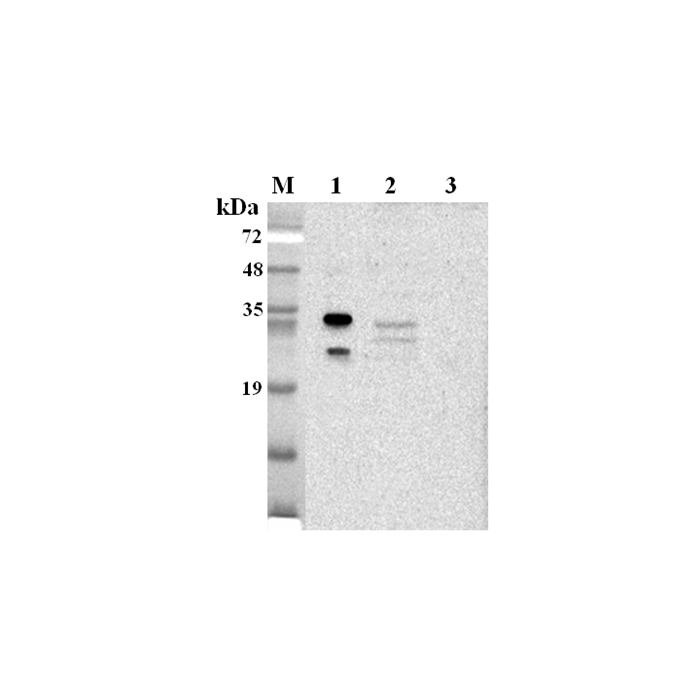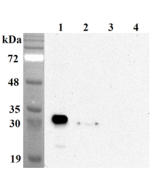Cookie Policy: This site uses cookies to improve your experience. You can find out more about our use of cookies in our Privacy Policy. By continuing to browse this site you agree to our use of cookies.
AdipoGen Life Sciences
anti-NQO1 (human), pAb

1: Human NQO1 (His-tagged).
2: HepG2 cell lysate.
3: Unrelated protein (His-tagged) (negative control).
| Product Details | |
|---|---|
| Synonyms | NAD(P)H Dehydrogenase (Quinine) 1 (NQO1); Quinone Reductase 1 (QR1); DT-Diaphorase (DTD); Azoreductase; Phylloquinone Reductase; Menadione Reductase; Dioxin-inducible 1; Disphorase-4 (DIA4); NAD(P)H:Quinone Oxireductase; NAD(P)H:Quinone Oxidoreductase 1 |
| Product Type | Polyclonal Antibody |
| Properties | |
| Source/Host | Rabbit |
| Immunogen/Antigen | Recombinant human NQO1. |
| Application |
ELISA: (direct and indirect: 1:2’000-1:5’000) Note: Tested on recombinant proteins and/or target-protein transfected cell lines in ELISA, Western Blot and/or FACS. |
| Crossreactivity | Human |
| Specificity |
Recognizes human NQO1. Detects a band of ~30kDa by Western blot. |
| Purity Detail | Protein A-affinity purified. |
| Concentration | 1mg/ml |
| Formulation | Liquid. 0.2μm-filtered solution in PBS, pH 7.4. Contains no preservatives. |
| Isotype Negative Control | |
| Shipping and Handling | |
| Shipping | BLUE ICE |
| Short Term Storage | +4°C |
| Long Term Storage | -20°C |
| Handling Advice |
After opening, prepare aliquots and store at -20°C. Avoid freeze/thaw cycles. |
| Use/Stability | Stable for at least 6 months after receipt when stored at -20°C. |
| Documents | |
| MSDS |
 Download PDF Download PDF |
| Product Specification Sheet | |
| Datasheet |
 Download PDF Download PDF |
NQO1 is a cytosolic antioxidant flavoprotein that catalyzes the reduction of highly reactive quinone metabolites and their derivatives by using NAD(P)H as an electron donor. Thus NQO1 acts as a detoxyfying enzyme and is involved in the body’s protection against oxidative stress. NQO1 acts as a protein chaperone, one of its targets being p53. In humans NQO1 is expressed at high levels in adipocytes and its expression levels are positively correlated with adiposity, glucose tolerance, and makers of liver dysfunction. Altered expression of NQO1 is associated with Alzheimer’s disease. NQO1 is abnormally elevated in many types of solid tumors and may represent a useful biomarker of pancreatic cancer.






